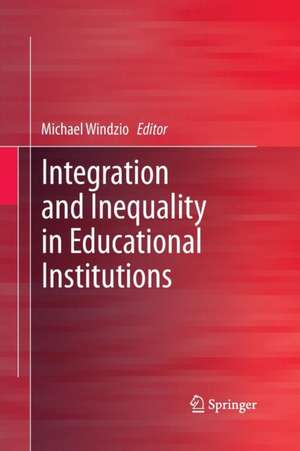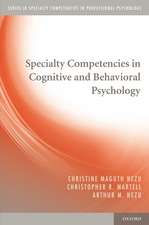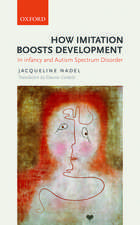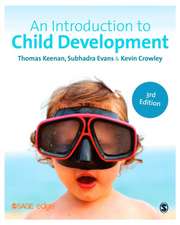Integration and Inequality in Educational Institutions
Editat de Michael Windzioen Limba Engleză Paperback – 12 apr 2015
| Toate formatele și edițiile | Preț | Express |
|---|---|---|
| Paperback (1) | 641.71 lei 6-8 săpt. | |
| SPRINGER NETHERLANDS – 12 apr 2015 | 641.71 lei 6-8 săpt. | |
| Hardback (1) | 647.92 lei 6-8 săpt. | |
| SPRINGER NETHERLANDS – 22 mar 2013 | 647.92 lei 6-8 săpt. |
Preț: 641.71 lei
Preț vechi: 754.95 lei
-15% Nou
Puncte Express: 963
Preț estimativ în valută:
122.81€ • 126.87$ • 102.21£
122.81€ • 126.87$ • 102.21£
Carte tipărită la comandă
Livrare economică 25 martie-08 aprilie
Preluare comenzi: 021 569.72.76
Specificații
ISBN-13: 9789401783989
ISBN-10: 9401783985
Pagini: 320
Ilustrații: IX, 310 p.
Dimensiuni: 155 x 235 x 17 mm
Greutate: 0.45 kg
Ediția:2013
Editura: SPRINGER NETHERLANDS
Colecția Springer
Locul publicării:Dordrecht, Netherlands
ISBN-10: 9401783985
Pagini: 320
Ilustrații: IX, 310 p.
Dimensiuni: 155 x 235 x 17 mm
Greutate: 0.45 kg
Ediția:2013
Editura: SPRINGER NETHERLANDS
Colecția Springer
Locul publicării:Dordrecht, Netherlands
Public țintă
ResearchCuprins
Foreword .- Introduction 1. Integration and Inequality in Educational Institutions: An Institutional Perspective by Michael Windzio .- Education and Society 2. Integration and the Education State. Institutional History and Public Discourse in England, France, Germany, and the US by Ansgar Weymann .- Institutions and educational outcomes in a comparative perspective 3. The School Performance of the Russian-Speaking Minority in Linguistically Divided Educational Systems: A Comparison of Estonia and Latvia by Kristina Lindemann .- 4. Positive but also negative effects of ethnic diversity in schools on educational performance? An empirical test using PISA data by Jaap Dronkers & Rolf van der Velden .- 5. Socio-Structural Effects on Educational Poverty of Young Immigrants - An International Comparative Perspective by Janna Teltemann & Michael Windzio .- 6. School Accountability, Autonomy, Choice and the Equality of Educational Opportunities by Gabriela Schuetz, Elke Luedemann, Martin R. West & Ludger Woessmann .- 7. Consequences of Changing Education Policies on Social Inequality – The Case of Japan – by Masashi Urabe, Ayumi Ono & Sherlyne Almonte Acosta .- Social networks and social capital in schools and classrooms 8. School Class Composition and Student Development in Cognitive and Non-Cognitive Domains: Longitudinal Analyses of Primary School Students in Germany by Thorsten Schneider .- 9. Immigrant Children’s Access to Social Capital in School-Class Networks by Michael Windzio .- 10. Social discrimination in Classrooms. The Contribution of a Social Networks Approach to Theory and Methods, andEmpirical Evidence by Chris Baerveldt .- 11. School interconnectedness and school inequality as determinants of the ethnic gap in violent behavior by Dirk Baier .- 12. Friendships of delinquent and non-delinquent adolescents in classrooms by Andrea Knecht .- Institutionalized transitions into and out of vocational training 13. Immigrants in the German Vocational Training System – A Closer Look at Young People with Low Educational Credentials by Can Aybek .- 14. New Institutional Linkages between Dual Vocational Training and Higher Education – A Comparative Analysis of Germany, Austria and Switzerland by Christian Ebner, Lukas Graf & Rita Nikolai .- 15. Conclusion: Institutional Effects on Integration and Inequality by Michael Windzio.& Sherlyne Almonte Acosta .- Social networks and social capital in schools and classrooms 8. School Class Composition and Student Development in Cognitive and Non-Cognitive Domains: Longitudinal Analyses of Primary School Students in Germany by Thorsten Schneider .- 9. Immigrant Children’s Access to Social Capital in School-Class Networks by Michael Windzio .- 10. Social discrimination in Classrooms. The Contribution of a Social Networks Approach to Theory and Methods, and Empirical Evidence by Chris Baerveldt .- 11. School interconnectedness and school inequality as determinants of the ethnic gap in violent behavior by Dirk Baier .- 12. Friendships of delinquent and non-delinquent adolescents in classrooms by Andrea Knecht .- Institutionalized transitions into and out of vocational training 13. Immigrants in the German Vocational Training System – A Closer Look at Young People with Low Educational Credentials by Can Aybek .- 14. New Institutional Linkages between Dual Vocational Training andHigher Education – A Comparative Analysis of Germany, Austria and Switzerland by Christian Ebner, Lukas Graf & Rita Nikolai .- 15. Conclusion: Institutional Effects on Integration and Inequality by Michael Windzio.
Textul de pe ultima copertă
This volume addresses questions that lie at the core of research into education. It examines the way in which the institutional embeddedness and the social and ethnic composition of students affect educational performance, skill formation, and behavioral outcomes. It discusses the manner in which educational institutions accomplish social integration. It poses the question of whether they can reduce social inequality, – or whether they even facilitate the transformation of heterogeneity into social inequality.
Divided into five parts, the volume offers new insights into the many factors, processes and policies that affect performance levels and social inequality in educational institutions. It presents current empirical work on social processes in educational institutions and their outcomes. While its main focus is on the primary and secondary level of education and on occupational training, the book also presents analyses of institutional effects on transitions from vocational training into tertiary educational institutions in an interdisciplinary and internationally comparative approach.
Divided into five parts, the volume offers new insights into the many factors, processes and policies that affect performance levels and social inequality in educational institutions. It presents current empirical work on social processes in educational institutions and their outcomes. While its main focus is on the primary and secondary level of education and on occupational training, the book also presents analyses of institutional effects on transitions from vocational training into tertiary educational institutions in an interdisciplinary and internationally comparative approach.
Caracteristici
Systematically links theory and research on educational processes in institutional contexts Offers an interdisciplinary and internationally comparative perspective on social integration and social inequality Highly relevant starting points for reforming educational institutions Includes supplementary material: sn.pub/extras











